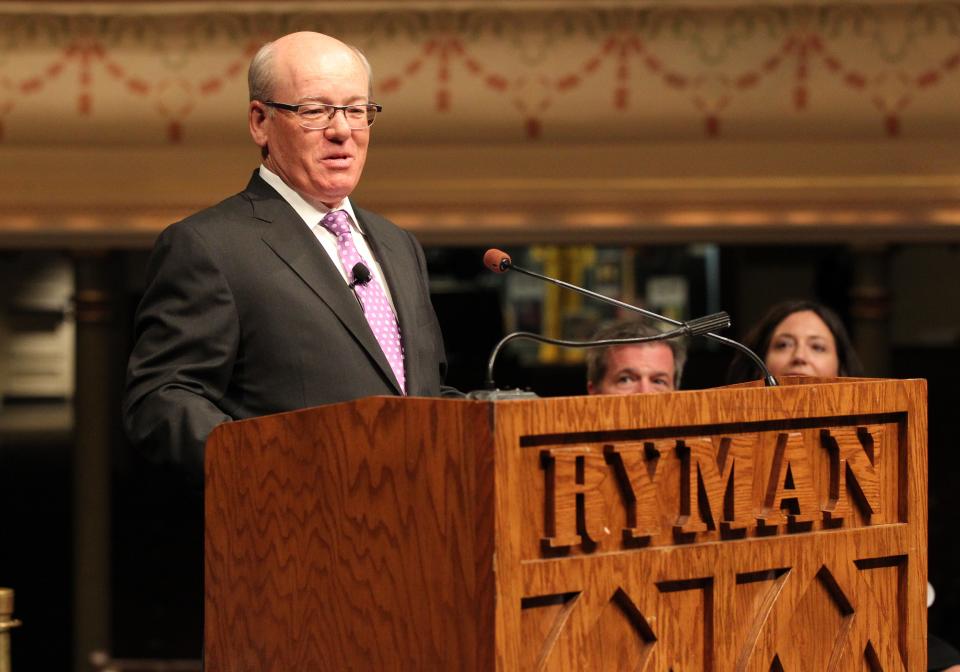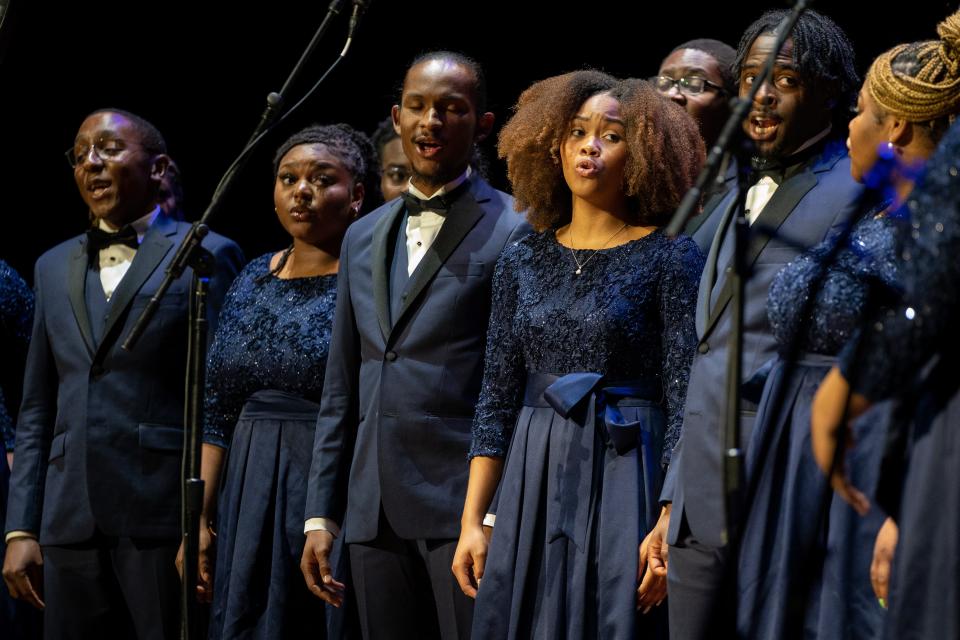For the Ryman and Grand Ole Opry, country music's evolution takes center stage | Hill
- Oops!Something went wrong.Please try again later.
The Ryman Auditorium in downtown Nashville is full of complicated history that involves both Confederate imagery and also a long tradition of supporting civil rights.
Colin Reed, CEO of Ryman Hospitality Properties, and his team understand this contradiction and they have deliberately worked to do the right thing, learning lessons along the way.
The goal is to create an inclusive place that honors the Ryman's legacy and welcomes the future performers and fans of country music.
This is the second in a series of columns about how country music industry leaders are responding to the racial reckoning in America.
The history of Confederate Gallery
On a warm Friday evening in downtown Nashville, I walk down Rep. John Lewis Way to a Walker Hayes concert at the Ryman Auditorium.
I hear loud party buses, smell the odor of booze and watch “woo girls” take over the streets.
Once inside the "Mother Church of Country Music" alongside my Tennessean colleague, Marcus K. Dowling, we move over the creaking hardwood floors as we take our center balcony seats in the hall's famous wooden pews.
I am a Tullahoma native and new fan to country music who is still trying to figure out my place as a Black man in this genre.
During the concert, Dowling, our country music columnist, points to the right side of the balcony section and tells me that's where the 1897 Confederate Gallery sign used to be.
I found myself shocked to learn that history among the music and cheering crowd.
In 1897, the sign was put up after thousands of Confederate soldiers came to the Ryman for their annual reunion. A plantation owner and Confederate general led the fundraising efforts to build the gallery, so the Ryman had enough space for the reunion.
In 2017, the Ryman decided to remove the banner from the balcony. Away from the venue's main hall, it is now located in their off-stage tour.
The sign represents the all-too-familiar complicated conversation surrounding race and history.
Hill: How Sony Music Nashville is stepping up as a leader in America's racial reckoning
Review: Allison Russell, Fisk Jubilee Singers seamlessly blend sacred, secular music at the Ryman
The truth is that in 130 years, there are bound to be dark parts of history. And therefore, you have to be committed and willing to address race.
For Reed, Ryman Hospitality’s CEO, having diversity and inclusion as the company's north star isn't a new idea but rather integrating the values into the company that he passed down to his sons.
The reality of race in America became apparent to Reed when his family moved from London to Memphis. In a private school, his son was bullied by white classmates after befriending a Black soccer teammate.
"(My son) was completely and utterly mortified by this. He didn't understand the ridicule. (Tyrell) was his friend," said Reed, who is white.
Reed's wife went to the school to address the bullying. But unfortunately, the school's headmaster and teacher told them there was nothing they could do to stop it.
Reed compared that moment to the Heisman stiff arm. After that, he and his wife decided to take their sons out of that school.
That situation led Reed to understand that you might not have all the answers, but there's still something you can do.
Discovering the soul of Nashville
The Ryman is dubbed "the soul of Nashville" for a reason. The Mother Church has been Music City's beacon since it was built in 1892.
Visiting the Mother Church in May, I discovered rich history. For instance, in 1961, The Ryman was host to "A Tribute To The Freedom Riders" benefit concert to aid Dr. Martin Luther King's civil rights work.
As we honor Dr. Martin Luther King Jr. today, we look back to "A Tribute To The Freedom Riders", a 1961 benefit concert right here at the Ryman to benefit King’s work in the civil rights movement. pic.twitter.com/L8MNZQS5ro
— Ryman Auditorium (@theryman) January 17, 2022
During the benefit's intermission, Dr. King awarded scholarships to college students who completed the Freedom Rides. One of those students was John Lewis.
It's also been home to Confederate reunions, but at the end of the day, it's Ryman history.
"In order for you to know where you're going, you've got to know where you’ve been," Reed said. "You can learn a lot from history, good and bad."
Reed continued to speak about the Confederate Gallery banner, saying that keeping the sign in the building was about preserving the Ryman's history. "Knowing history is important and it's not validating history; it's just knowing what went on and why."
Reed's point of knowing history is a tough pill to swallow in our country. In Tennessee, teaching of Black and LGBTQ histories the unauthorized way may lead to the loss of school funding.
Reed also sees the business side as another way to move the diversity conversation forward.
He sets his business infrastructure on three staples: Consumers, employment practices and artists. He seeks to weave diversity into this framework.
"If you have a business that has positioned itself to (cater to consumers), those consumers are not all white men, those consumers are a very diverse group of people, " says Reed. "Your organization should have representation that looks like your customer base."
With a net worth exceeding $4.7 billion, Ryman Hospitality Properties is one of Nashville's economic powerhouses. The company's portfolio includes the Ryman, Grand Ole Opry House, Gaylord Opryland Resort &Convention Center, Wildhorse Saloon, and the Broadway Honky Tonk Ole Red, a partnership with Country Artist Blake Shelton, all in Nashville, as well as several ventures in other cities.

Past, present and future converge at the Grand Ole Opry
Everyone, Black or white, is drawn to the magic that lives within the Ryman and the Grand Ole Opry house. I stepped into both auditoriums and felt like I was back in my home church in Tullahoma.
What makes the Grand Ole Opry house special is that it's a place where country music's past, present and history are constantly intertwined. For Dan Rogers, vice president and executive producer of the Grand Ole Opry, the beauty of that dynamic is not lost on him.
"It's an honor and a responsibility," said Rogers. "The honor speaks for itself for anybody who comes to see a show (at the Opry House). The responsibility to me is to propel the music the Opry's been known for throughout its history but also the responsibility to get it right, to realize the Opry and country music has made mistakes along the way in a 96-year history. While you can't change history, we can make sure we're doing everything we can now to celebrate the parts that need to be celebrated and work toward an inclusive and enjoyable history."
Evolution of country music: Rissi Palmer empowers herself, other acclaimed artists rising from country music's margins
Inspiration: Adia Victoria, Lizzie No inspire Black female creativity by reconnecting to the blues
The Opry is frankly a majority white space. And with that comes a small margin of error when gaining a more diverse audience and artist lineup.
In January, the Opry drew criticism when Morgan Wallen, the country artist once caught on camera saying a racial slur in Nashville, made a surprise appearance at an ERNEST performance at the venue.
During the interview I held with Ryman leaders, they confirmed they knew of Wallen's appearance 72 hours before the show show.
The criticism against the Opry is important, but it's also vital to examine their efforts.
What is the Opry doing about growing a diverse audience?
Opry statistics highlight a rise in diversity.
For example, Opry statistics show a 9% increase in artists of color who've taken the Opry stage from 2017 to May 2022.

Beyond just a statistic, this increase shows that the Opry team sees inclusion as a part of their future.
Another bright spot for the Opry is creating in 2019 the Opry Next Stage program, where upcoming artists can showcase their talents. Next Stage seeks to help young artists succeed by providing promotional support for their brand. This is where Ryman Hospitality can push its diversity efforts by ensuring each Next Stage class includes artists from many backgrounds.
Jordan Pettit, the director of artist relations and programming strategy for Opry Entertainment Group, believes the Opry is on the right track.
"The Opry is trying to offer country music credibility to bold artists with unique backgrounds and life experiences whose originality comes to the forefront under the spotlight," Pettit said. "We're attempting to speak to a broader array of audiences about [country music's] vibrant, diverse future across the Opry Entertainment Suite brands."
Both the Grand Opry House and Ryman Auditorium are synonymous with Nashville. They both brighten the beacon that attracts millions to come to Music City every year.
Not only do they attract visitors, but they house a generational spirit that artists get to embrace.
New Orleans native Joy Clark performed at the Ryman with Allison Russell and the Fisk Jubilee Singers on June 28 and felt compelled by the spirits housed at the Mother Church.
"It felt like a wall of protective Black sound, an army, a fortress of ancestors protecting us. I've never experienced joy like that, on that song," Clark said. "That level of spirituality is how the Ryman should feel, forever, for Black people singing out ancestry."
Country artist Rissi Palmer's recent performance at the Opry signified a full circle moment for her as she had the opportunity to invite long-time friend and fellow country artist Miko Marks to perform songs including The Judds' classic "Flies On The Butter."
The act brought 2014 Country Music Hall of Famer Ronnie Milsap's words about the Opry to life: “I feel this is a family here, so kinda regardless of whatever happens in your life, you always can come home to the Grand Ole Opry, thank God.”
Reed, Rogers and the rest of the Ryman Hospitality team have a passion for these famed venues and the artists who come through them.
And with that, the evolution of country music will continue.
LeBron Hill is an opinion columnist for the USA TODAY Network Tennessee and the curator of the Black Tennessee Voices newsletter. Feel free to contact him at LHill@gannett.com or 615-829-2384. Find him on Twitter at @hill_bron or Instagram at @antioniohill12.
This article originally appeared on Nashville Tennessean: Country music's evolution takes center stage for Ryman, Grand Ole Opry

